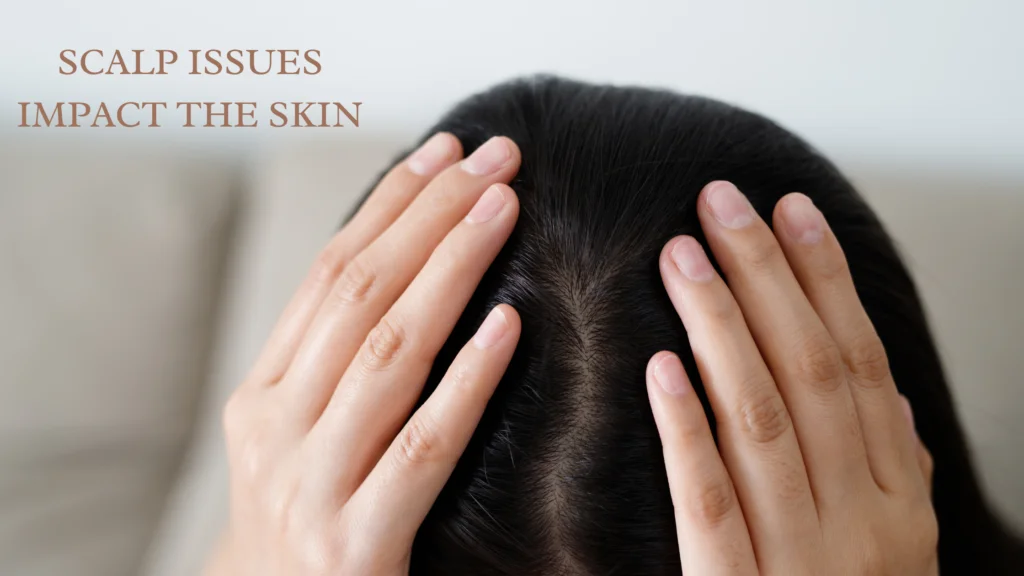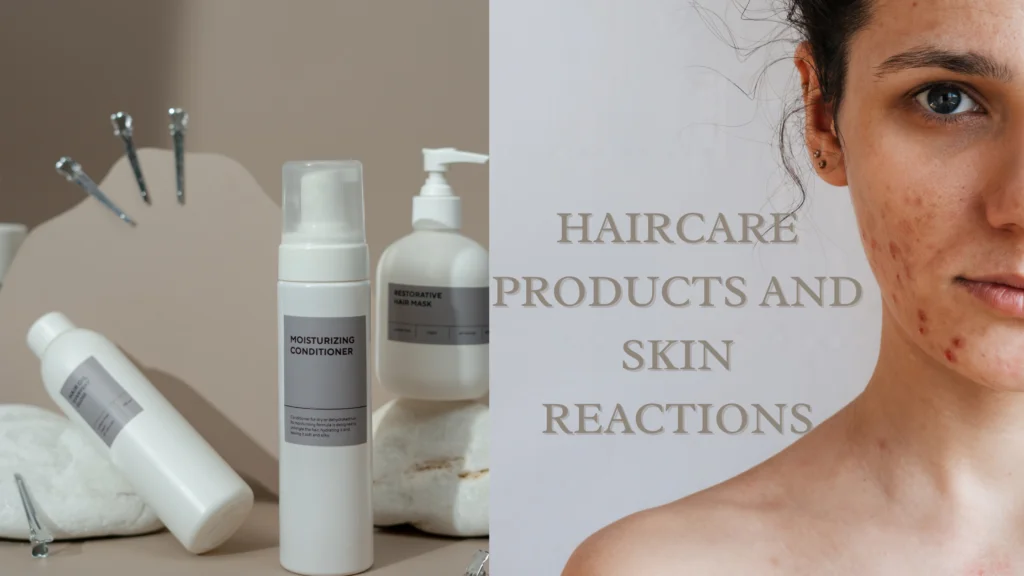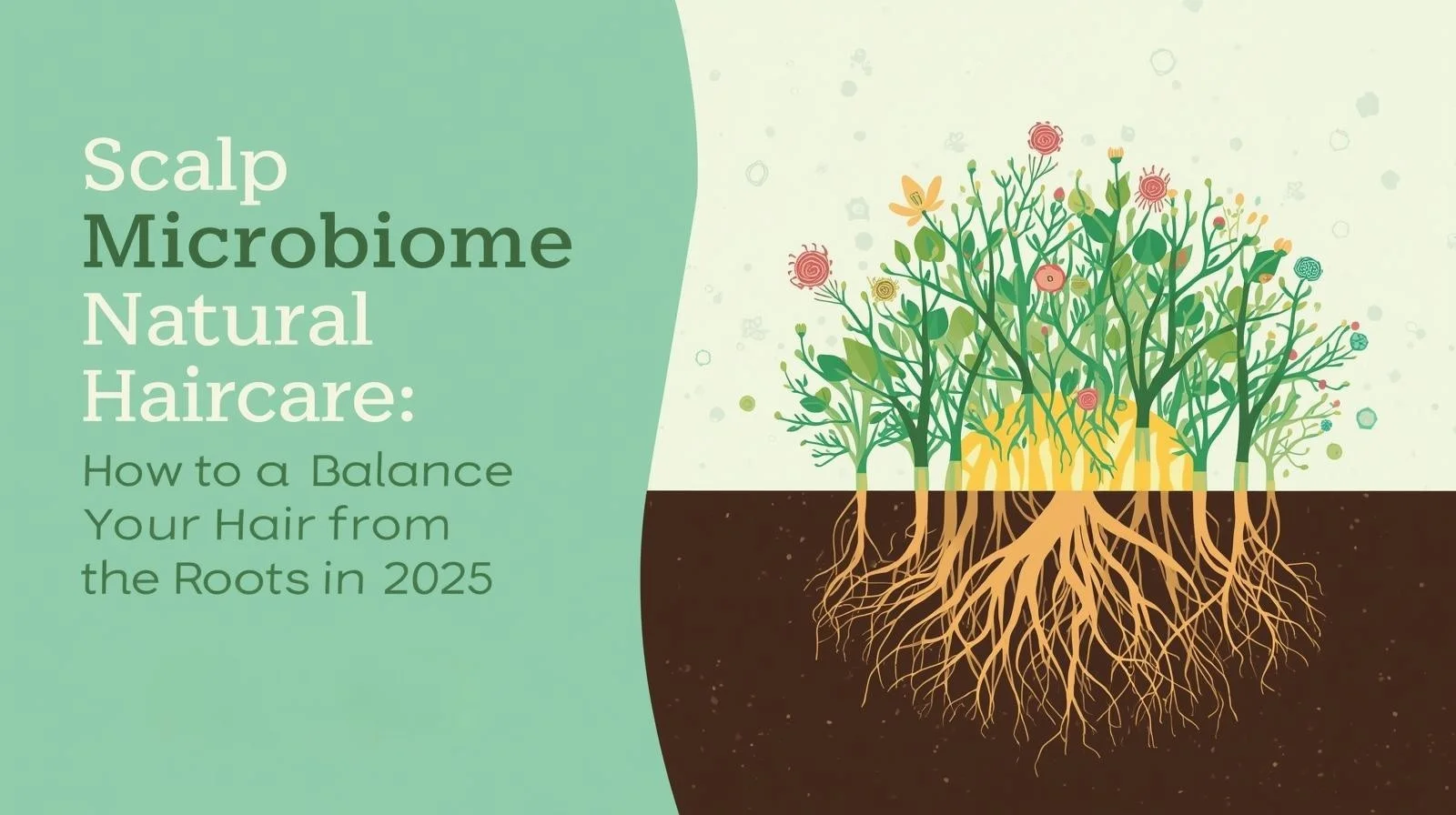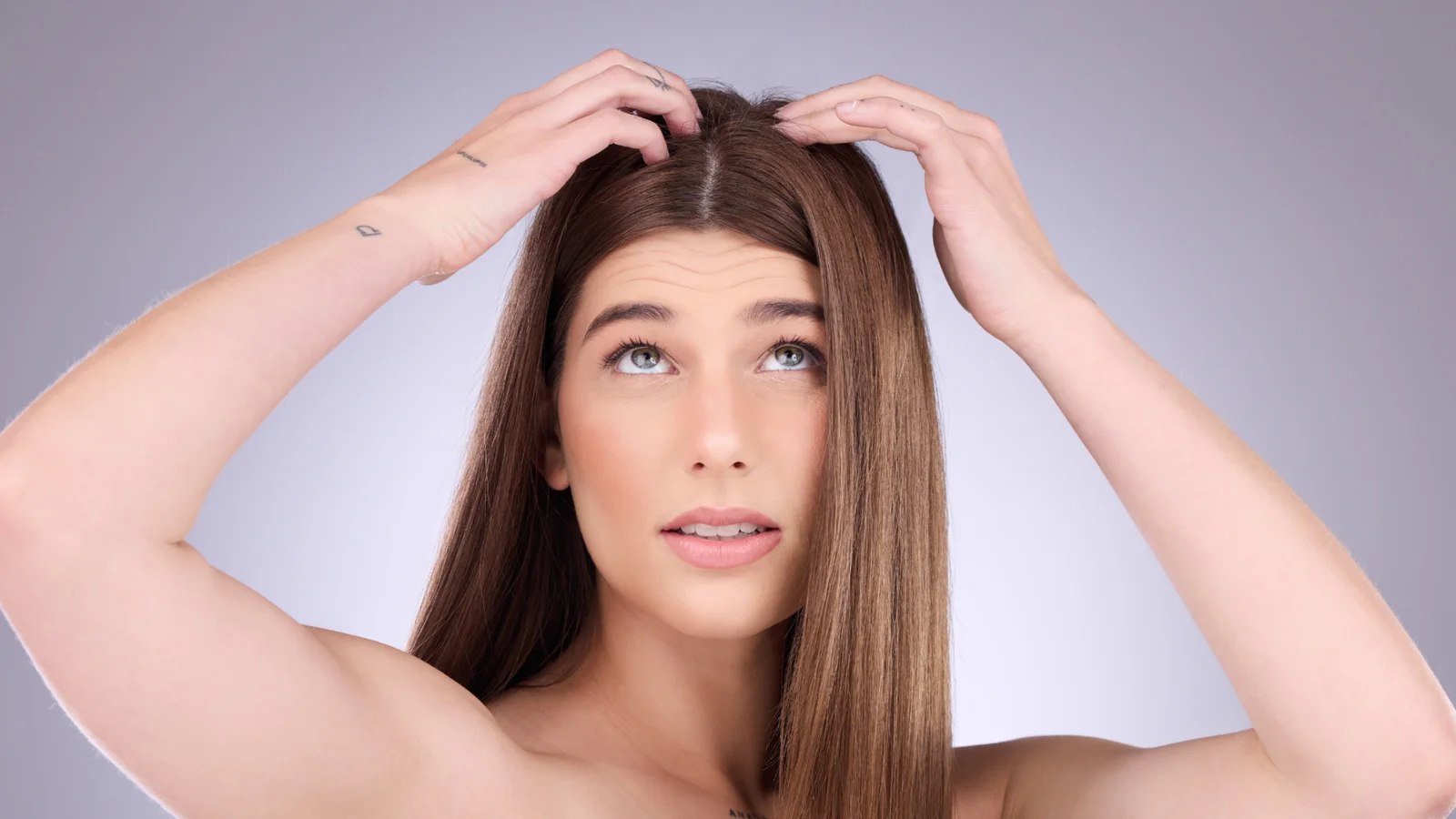Introduction
The skin on the scalp and face might seem different, but they are the same! Did you know that the scalp is an extension of the face?
The scalp and the skin on your face and body are interconnected in ways that may not be immediately obvious. While it’s easy to focus on skincare routines for your face or body, the health of your scalp can have a major effect on the skin overall. The skin on the scalp is more sensitive than that on the rest of the body. It contains more sebaceous glands, sweat glands, and hair follicles.
Let’s dive into how scalp health affects the skin and why taking care of your scalp should be a part of your overall skincare regimen.

Connection Between Scalp and Skin
The skin on your scalp is similar in structure to your face. It has hair follicles, and sebaceous (oil) glands, and is affected by environmental factors like pollution, sun exposure, and products used on it. Like other skin areas, the scalp can suffer from dryness, inflammation, or excess oil production, all of which can impact the skin elsewhere in your body.
When your scalp health is compromised, whether from dandruff, scalp acne, or irritation, it can trigger a chain reaction that impacts the skin on your face and neck.
Scalp and Skin Barrier Function
The skin, including the scalp, acts as a barrier against environmental stressors like bacteria, viruses, and pollution. If your scalp is unhealthy—whether from dryness, oiliness, or conditions like seborrheic dermatitis—it can compromise this barrier. The scalp has a natural oil (sebum) that helps protect it and keep it hydrated. When there is an imbalance in sebum production, the barrier function is weakened, potentially leading to:
Dryness: If the scalp becomes too dry, it may shed flakes, leading to dandruff. Dryness on the scalp can sometimes result in other dry skin patches on the body as well.
Excess Oil: An overly oily scalp can block hair follicles and pores, leading to clogged pores, inflammation, and the potential for acne or folliculitis on the face, neck, and back.
Inflammation: Conditions like seborrheic dermatitis and psoriasis, which are common scalp issues, often have a systemic effect. These conditions can spread beyond the scalp and manifest as skin irritation and rashes on the face or upper body.
Inflammation and Skin Conditions
It can trigger systemic inflammation when your scalp is inflamed, whether due to dermatitis, psoriasis, or other skin conditions. This inflammation can extend to the skin on your face, leading to conditions like acne, rosacea, or eczema. For example, a common issue with a flaky, irritated scalp is seborrheic dermatitis. This condition is not limited to the scalp; it can cause a similar reaction on the skin around the ears, forehead, and even the chest.
In severe cases, scalp irritation can also make the skin conditions worse. If you already suffer from eczema, acne, or rosacea, scalp issues can worsen flare-ups due to the inflammation and imbalance caused by the irritation.

Hair Care Products and Skin Reactions
Many hair care products, including shampoos, conditioners, gels, and hairsprays, contain ingredients that may irritate the scalp and even the skin on the face and body. For instance:
Clogged Pores from Oily Products: Some products leave residues on the scalp and hair that can migrate to the skin and clog pores, leading to acne outbreaks around the forehead, temples, and even the chest or back.
Fragrances and Dyes: These can trigger allergic reactions and sensitivities, leading to redness, itching, or even rashes on both the scalp and surrounding skin.
Sulfates and Alcohols: Harsh ingredients found in some shampoos and styling products can strip natural oils, causing both the scalp and face to become dry, irritated, or inflamed.

The Impact of Diet and Lifestyle on Scalp and Skin Health
Your diet and lifestyle largely impact your skin and scalp. A poor diet, dehydration, and high levels of stress can negatively affect both.
Diet: Diets high in sugar, dairy, and processed foods may exacerbate conditions like acne and dandruff. On the other hand, foods rich in omega-3 fatty acids, antioxidants, and vitamins (like vitamins A, C, D, and E) are beneficial for the skin and scalp. These nutrients help fight oxidative stress, reduce inflammation, and promote healthy skin and scalp functions.
Hydration: Dehydration can lead to dry skin and scalp. The scalp needs moisture to stay healthy, and insufficient hydration can result in dry, flaky skin or scalp conditions like seborrheic dermatitis or eczema.
Stress: Chronic stress can trigger or worsen conditions like acne, eczema, and psoriasis. Stress can increase the production of cortisol, a hormone that contributes to inflammation. This increased inflammation can affect both your skin and scalp health.
How to Maintain Both Scalp and Skin Health
Did you know that maintaining good scalp health is key to ensuring that your overall skin remains healthy as well? These tips will help you in taking care of your scalp and skin:
Regular Scalp Cleansing: Cleanse your scalp regularly to remove excess oil, sweat, and product buildup. Use a gentle shampoo designed for your scalp type (oily, dry, sensitive, etc.) to avoid irritation. Avoid harsh chemicals that could damage your scalp and skin. Do not overwash your hair as that could be harmful for your hair.
Moisturize and Hydrate: Moisturizing your scalp and skin is important. For the scalp, use oils such as argan oil or coconut oil to nourish and hydrate. For your skin, use hydrating serums or moisturizers. Opt for natural hydrating ingredients like aloe vera to avoid chemicals and reactions.
Exfoliate Your Scalp: Just like your skin, your scalp needs exfoliation to remove dead skin cells and promote healthy hair growth. You can use scalp scrubs or brushes designed for this purpose.
Balanced Diet: Incorporate more anti-inflammatory foods, such as fatty fish, nuts, seeds, and green leafy vegetables, into your diet to nourish your skin and scalp. Drink plenty of water to stay hydrated.
Sun Protection: Protect both your scalp and skin from harmful UV rays. Consider wearing a hat or using hair and skin sunscreens to safeguard your scalp from sunburns or premature aging.
Consult a Dermatologist: If you experience scalp conditions like dandruff, psoriasis, or seborrheic dermatitis, it’s important to seek advice from a dermatologist to treat these issues before they spread to your skin.
Conclusion
Scalp health and skin health are deeply interconnected. The condition of your scalp can influence various skin issues, including acne, inflammation, dryness, and premature aging. Maintaining the health of your scalp by following good hygiene practices, using the right products, and taking care of your diet and hydration can have a positive impact on your skin. The more you take care of both, the better the results for your overall skin health. Healthy scalp = healthy skin!
EXPLORE MORE
- Cortisol: Meaning, Effects and How to Maintain Its Levels
- 10 Tips to Achieve Your Wellness Goals and Increase Productivity
- Ayurveda in the Modern World – How is it still Relevant?
- How Sleep Deprivation Affects Your Mental and Physical Health | Preity Prerna
- Hydrating vs Moisturizing in Skincare – What is the Difference?
- Acne Scars, Open Pores, Large Pores & Dark Spots | Preity Prerna
If you’re not a part of our amazing family, you’re missing out. Join us today and start your natural skincare and haircare journey and get help from other community members.







